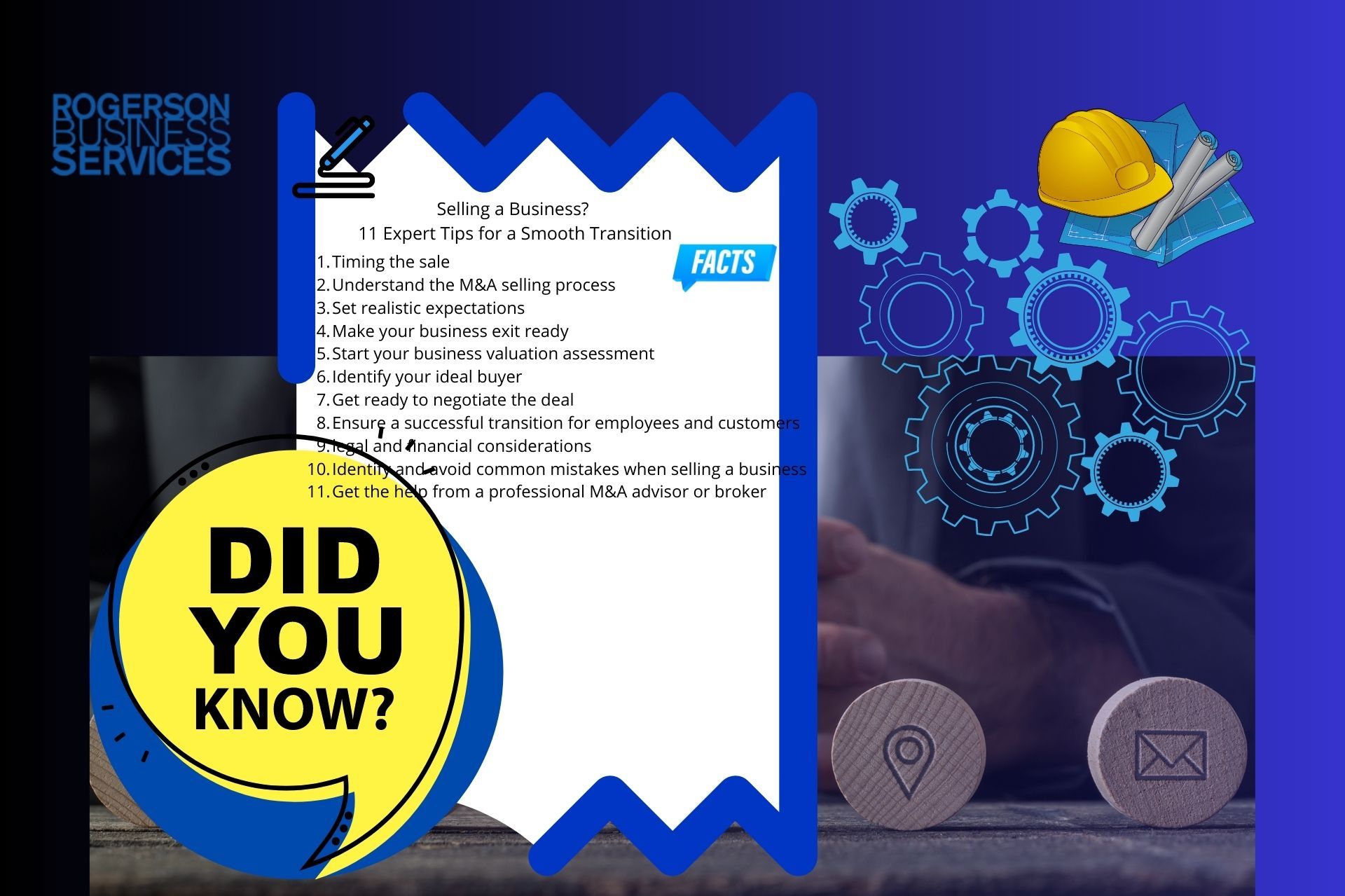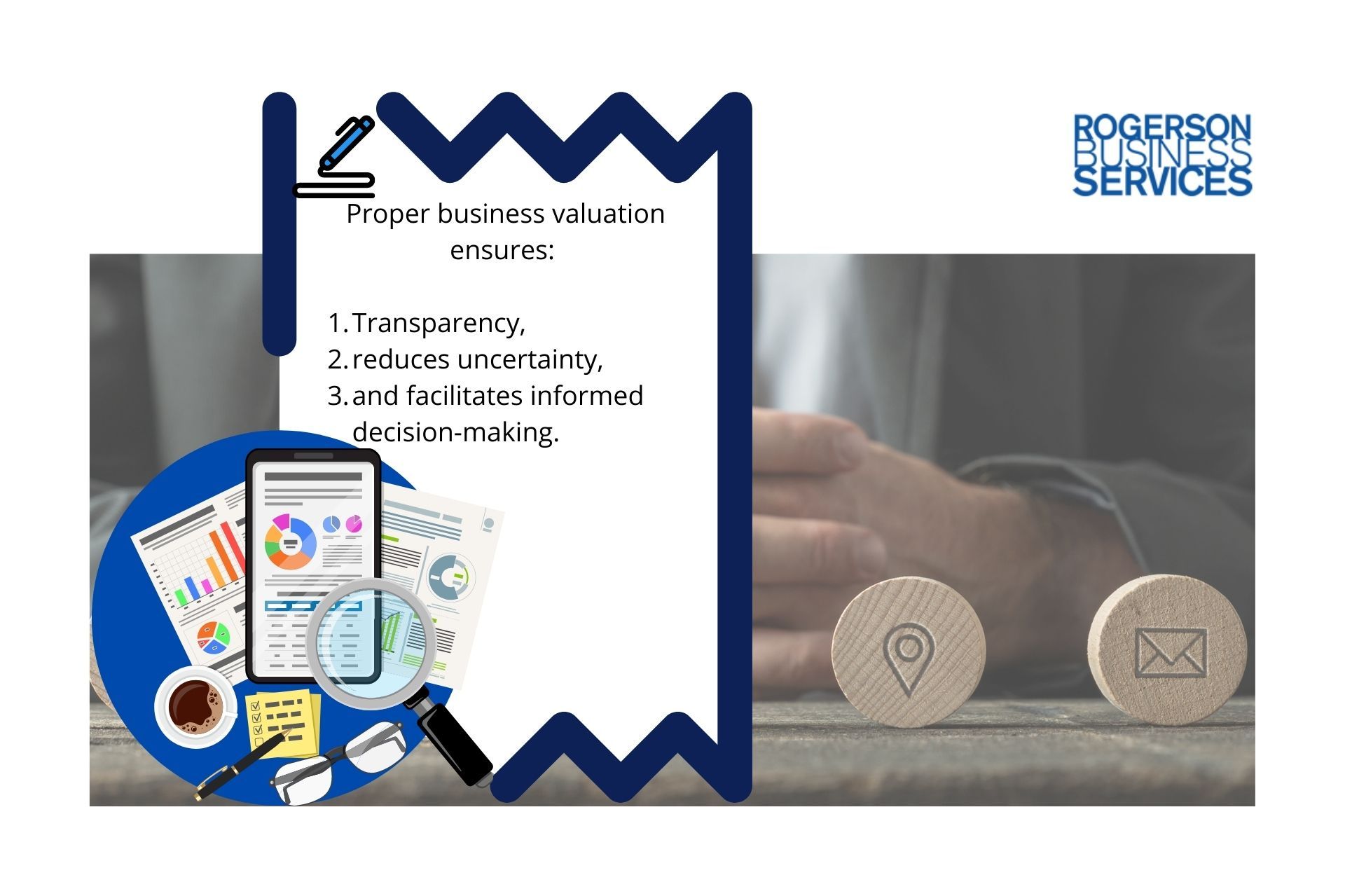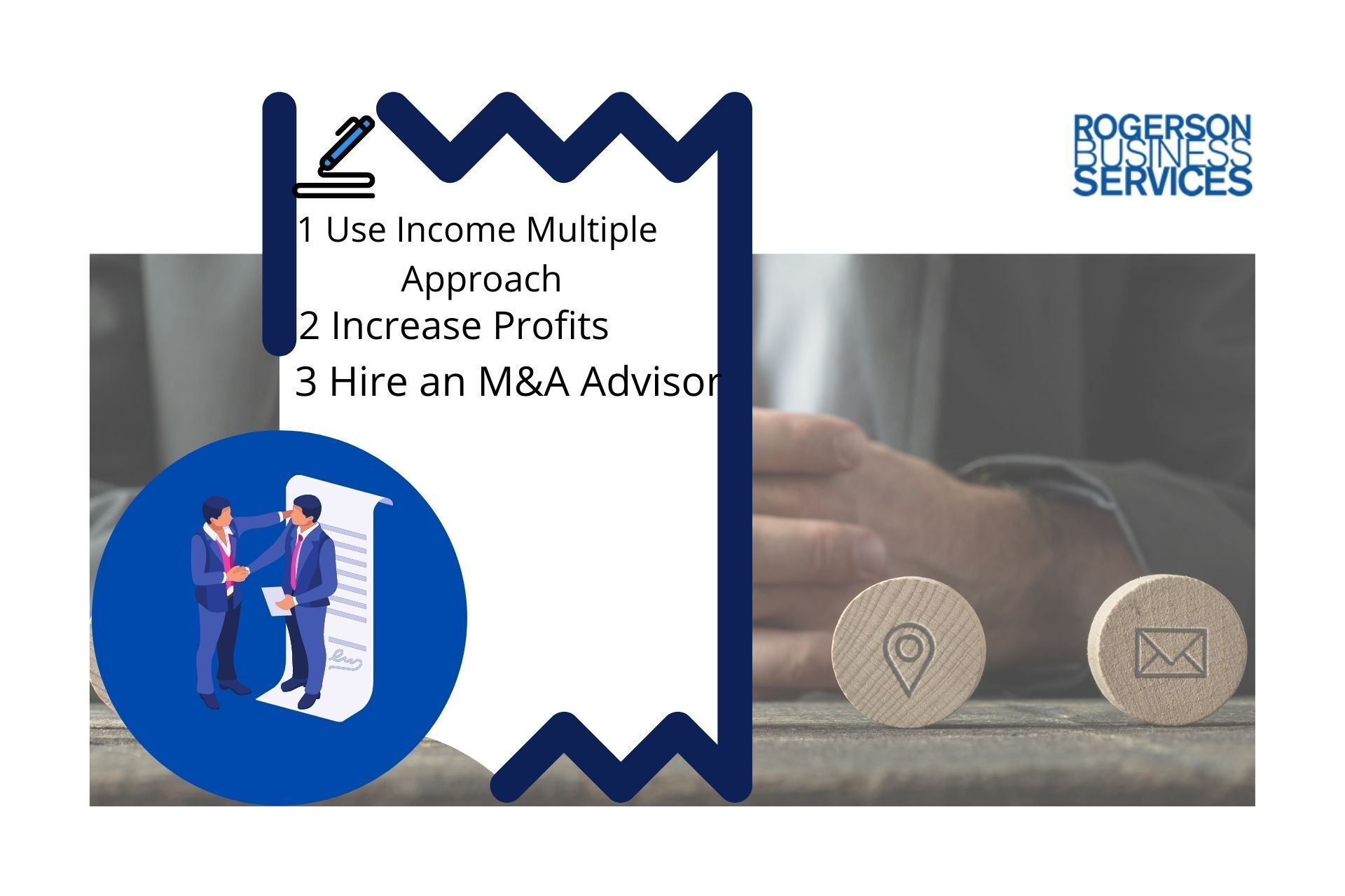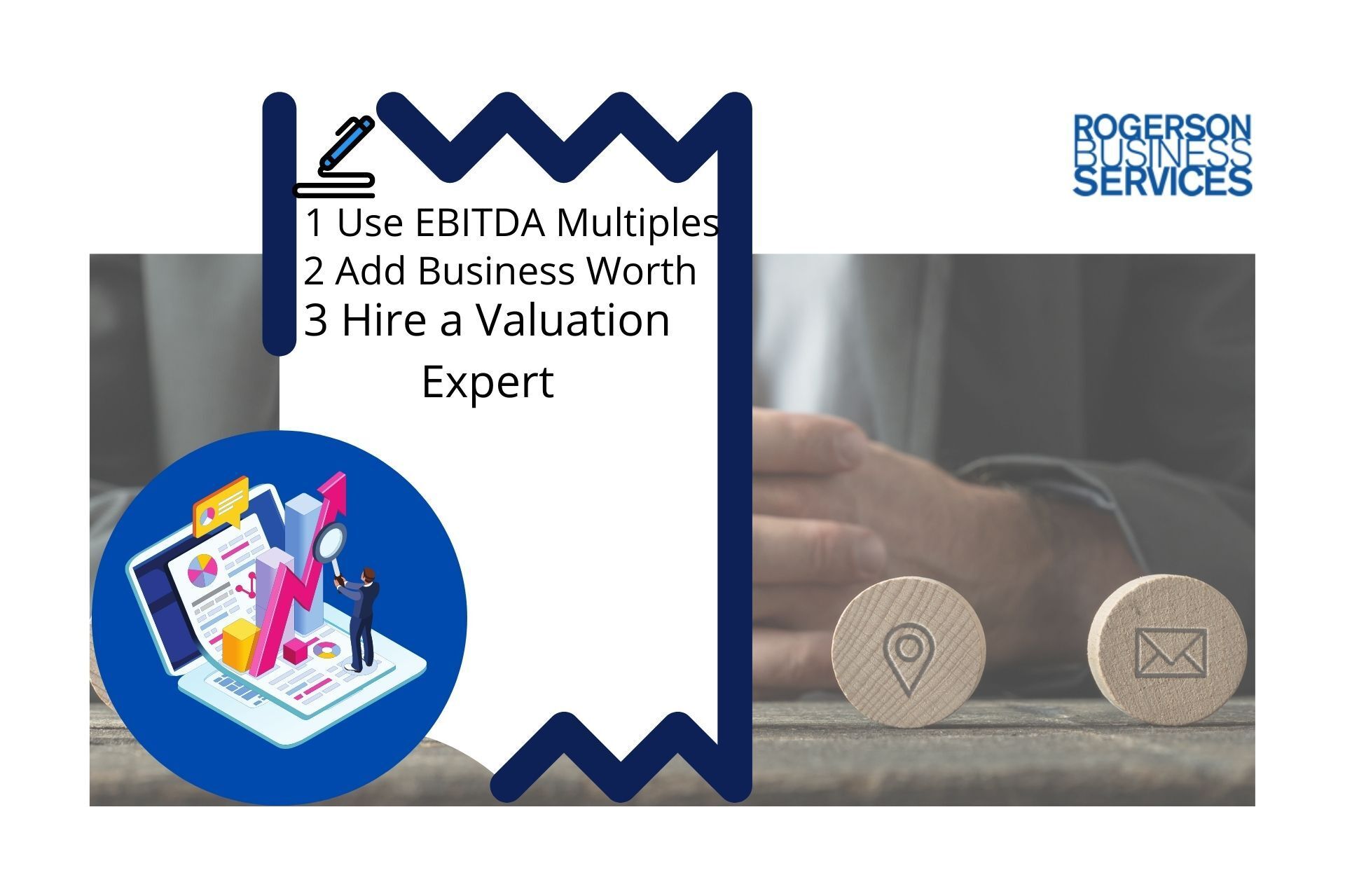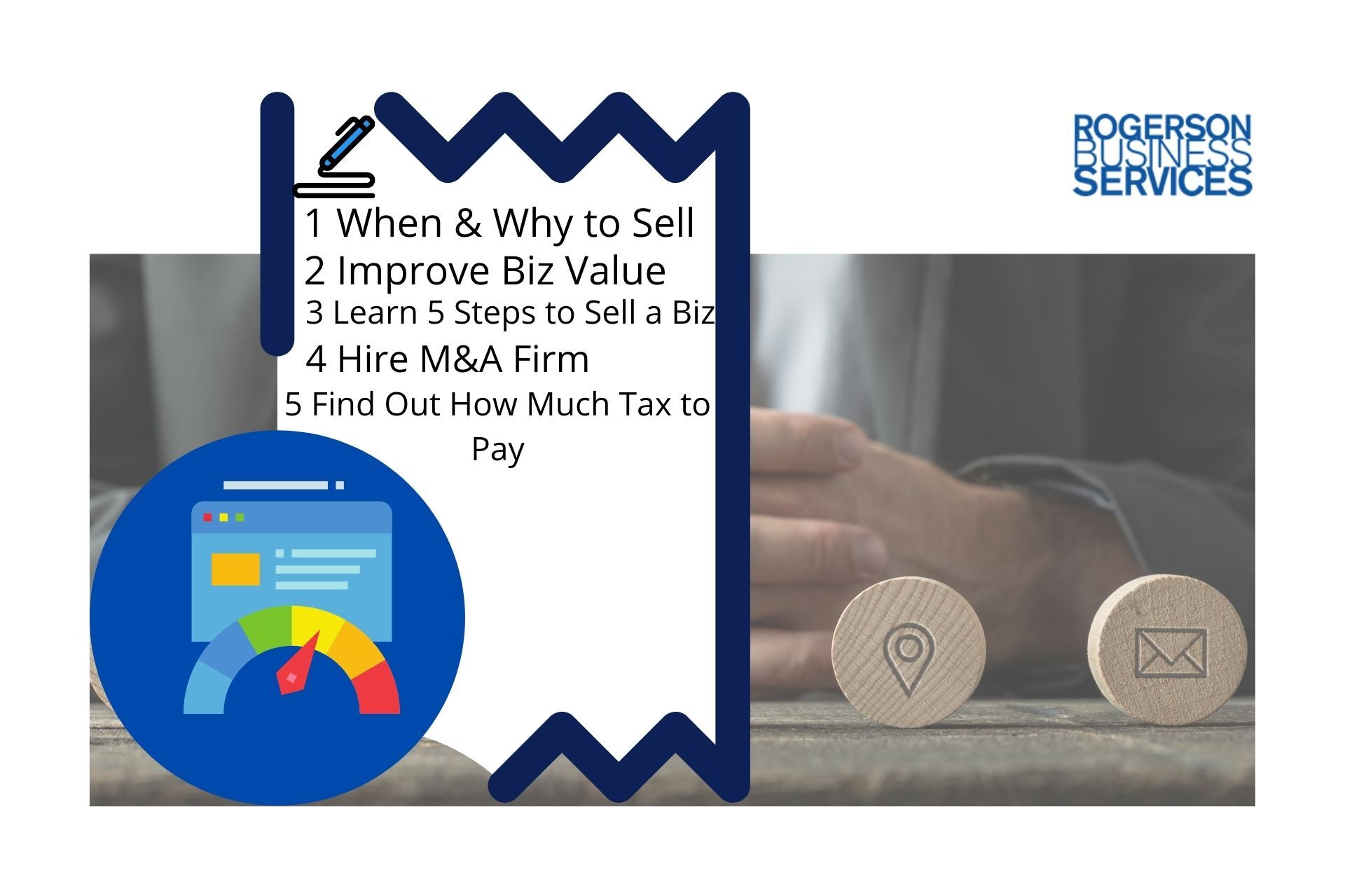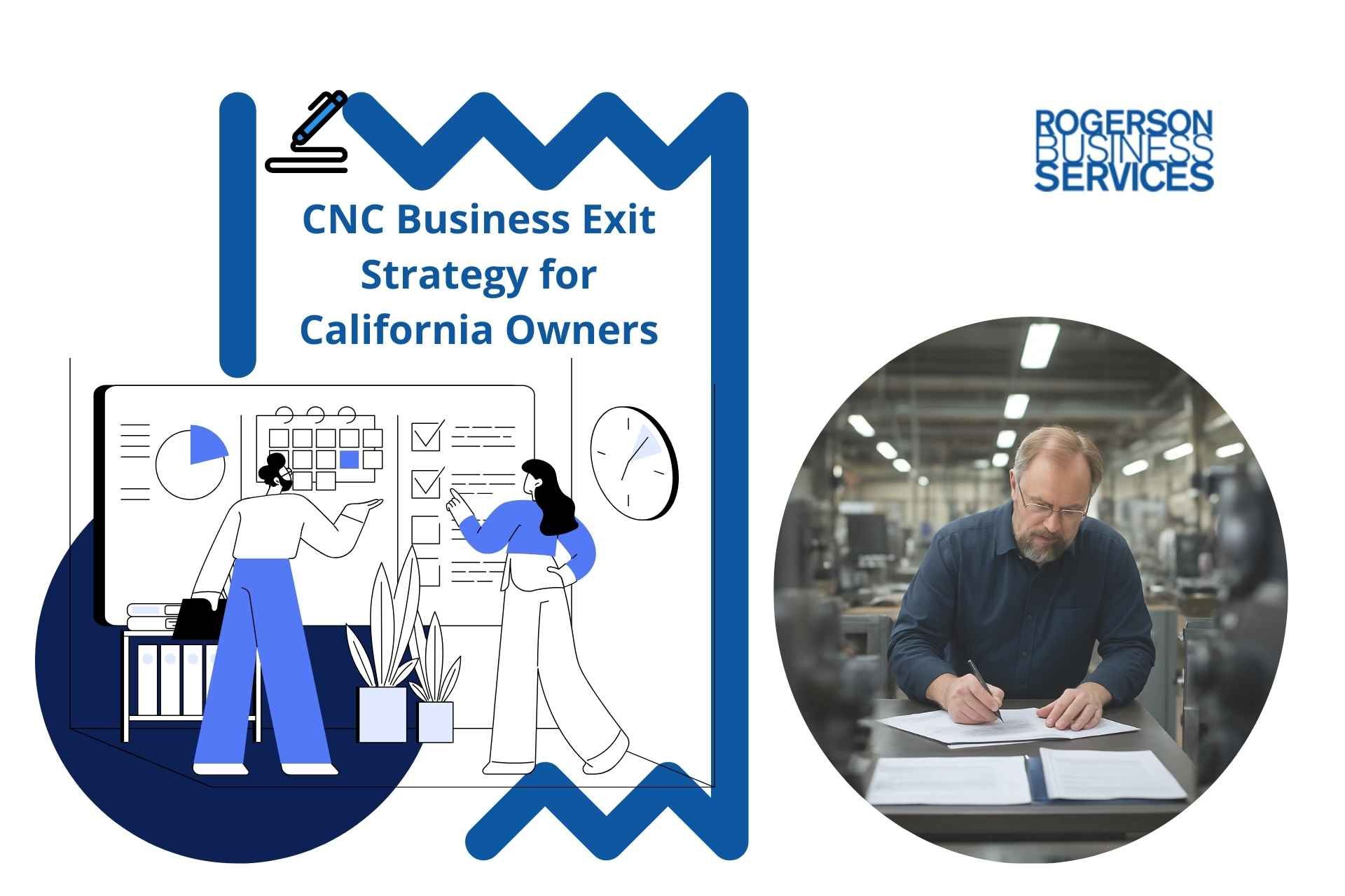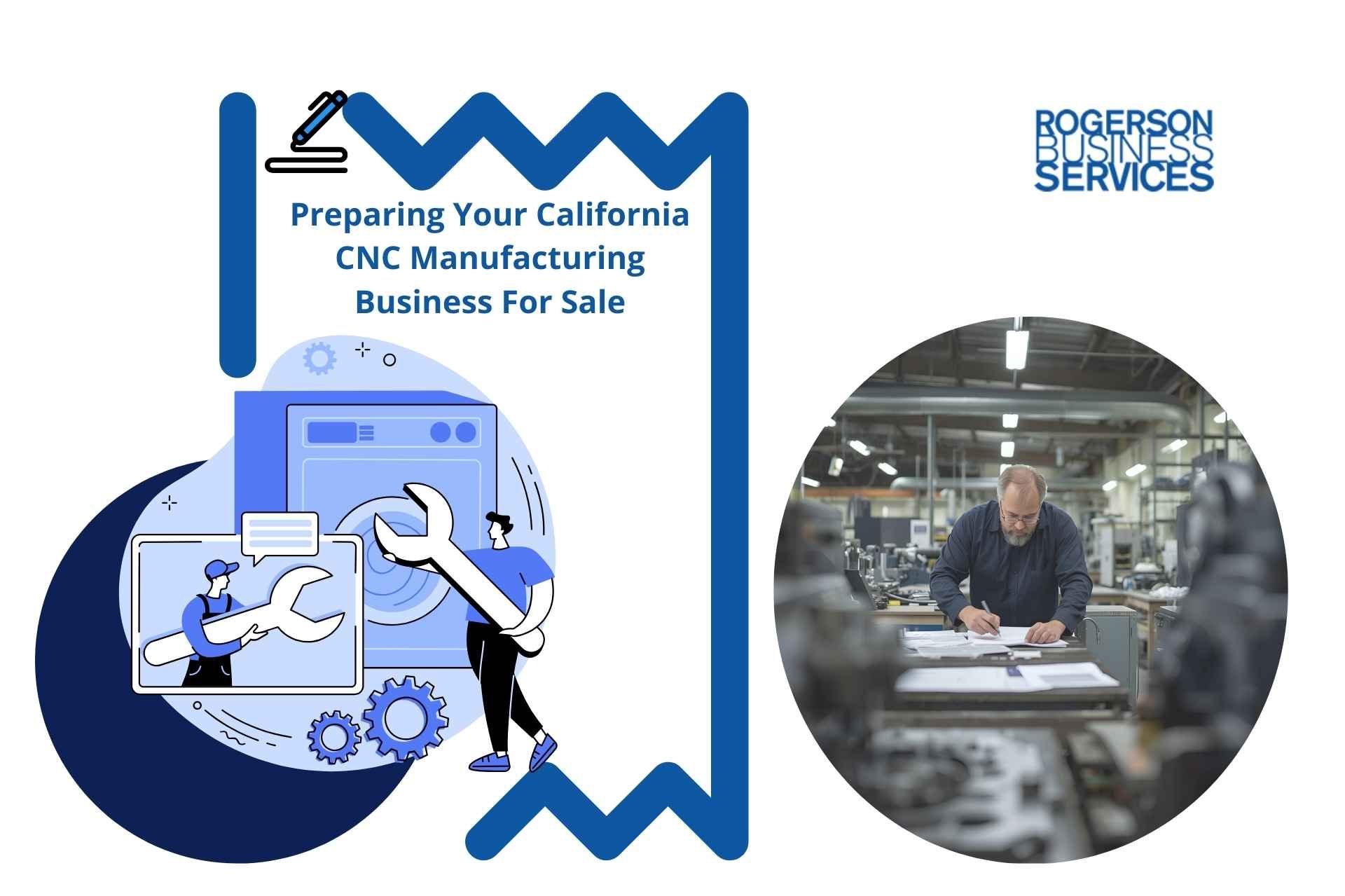The M&A Guide To Help Sell A Business Services Company
Considering to sell a business services company in the lower middle-market can be overwhelming in California. Without a proper, well prepared, exit plan, and an intermediary or professional business M&A Advisor to facilitate the sell-side M&A process, there is no way to guarantee that you made the right decision.
Get The Guide
M&A Guide
Increase Your Chance Of Success!
Guide to help sell business services company
Everything you need, all in this sell a business services company guide
Table of Contents
Exit Strategy: Sell a Business Services Company
Whether you’re considering retirement, looking to free up capital for a new venture, or it’s simply time for you to move on from your business, there are several reasons why you may be considering selling a California Business Services Company.
Today, we’re going to take a deep dive into everything you’ll need to know if you’re considering a sale, from developing an
exit strategy for your business to selecting an M&A Advisor and everything in between.
Top Reasons to Consider an Exit Strategy
When ownership is considering a sale, developing an exit strategy framework is one of the most crucial business undertakings. An exit strategy is a detailed plan for the ownership transition, whether that be a private sale or an IPO.
There are plenty of good reasons to learn
how to prepare an exit strategy, and if any of these reasons resonate with your business, it may be time to consider your next move.
Financial Considerations
Depending on the financial strategy, there are bound to be potential investors who aren’t a good fit for purchase. By creating a comprehensive exit strategy, you’re able to develop a plan that will attract the largest pool of investors when selling your lower middle-market business.
Tax Concerns
The sale of a business has substantial tax implications that must be carefully considered. As the owner, it’s in your interest to reduce the tax considerations that arise from the business's operation and sale. Addressing the tax implications of operating your business and streamlining them wherever possible will make your business more attractive to potential suitors.
Unexpected Sales
Many business owners have no intention of moving on from their business until they receive an offer they can’t refuse. Acquisitions are one of the most popular ways for a company to grow in the 21st-century, and it’s common for a larger business to make an attractive offer to acquire a smaller firm.
Without business exit strategy planning, you won’t be ready to respond if an offer is made, and when you do respond, the buyer may have already moved.
More Accurate Valuation
For an exit strategy to be effective, the company must carefully evaluate potential buyers and their motivations. Your company should also perform a detailed SWOT analysis to identify areas of improvement that would make your business more attractive to potential buy-side M&A firms.
Performing these tasks also helps a business arrive at a well-developed valuation. When you have a better idea of who your potential buyers are and what they’re looking for from an acquisition, you’ll be better positioned to deliver what they’re looking for.
Smooth Transition of Ownership
The sale of a business is a potentially disruptive time that can affect the company's profitability and performance. Each transfer scenario is different, and without a strong exit strategy in place, it’s common for dysfunction to arise during the ownership transition.
A solid exit strategy will clarify each party's responsibilities during the transition, so the business can continue with as little disruption as possible.
Unforeseen Crisis
It’s common for business owners to experience an event that would cause them to sell their business. Issues such as divorce, death, or sickness are things we all deal with, and a strong exit strategy is an ideal way to address the potential for these events.
With a strong exit strategy that addresses potential crises, you’ll be in a better position to stay afloat and sell the business if it’s ever necessary to do so.
Striking While the Iron is Hot
The goal of any owner pursuing the sale of a business is to sell the business at an ideal time to the highest possible bidder. Of course, for that to happen, the framework must be in place to take the company through the acquisition.
Having an exit strategy in place ensures that you’ll be appropriately positioned to maximize your price when the time is right for a sale.

How to Sell a Business Services Company
When the time is right for you to move on from your business, the guide below can help you properly position the business so you can maximize the sale.
Preparing to Sell a Business - Business Services Sector
Within the Business Services sector, there are many unique opportunities and challenges that are unique to service businesses. As you begin to consider your prospects for sale, there are a few preliminary questions you’ll need to answer to ensure that you are on the right path.
Is Selling An Economically Smart Decision?
Many business owners have trouble deciding if they have arrived at the right time to sell their business and if selling is a financially sensible decision. The easiest way to determine whether the time is right is to consider how the sale proceeds of the business compare against the earnings the business currently produces.
If the business continues to earn as it does today, how does that compare against the sale price of the company? Will the present value of all future dividends and distributions less taxes be greater than the business's sale price, less the costs associated with the sale?
How Will You Invest The Proceeds?
Most business owners will reinvest the proceeds of the sale of their business into a new venture, and that new venture can play a crucial role in deciding if the time is right for you to sell. Knowing how you’ll invest and approximating those investments' return rate is critical as you develop a picture of what the sale of your business could look like.
Are All Stakeholders on Board?
Unless you’re the business's sole owner, there are bound to be other owners or critical stakeholders you will need to consult with before deciding if a sale is the best next step for your business.
If all stakeholders are not on board, what can you do to listen to their opinion and incorporate it in your final decision? What options are available for you to exit the business if other owners are opposed to selling?
Business Valuation
What is it? Why do I need one if I'm planning to sell a business? What is the business worth?
Types of Business Services
The Business Services sector is incredibly varied, and a cornucopia of different businesses fall under the umbrella of Business Services. Are you unsure whether or not your business is considered a service business? Read on, as we provide a comprehensive list of Business Services Company Types.
Employment Services
Employment services make up most service businesses, driving nearly 40% of the revenue in the category. Employment services break down into three main categories:
- Placement agencies
- Temporary help services
- Professional Employer Organizations (PEOs)
At a placement agency, the agency works to place employees from their pool of qualified talent in permanent positions with a customer company or client. Temporary help services serve a similar function, but the workers they place are hired temporarily, typically replacing a long-term employee on leave or during periods of high demand.
PEOs are contracted by a customer company to provide employees to serve specific functions, and it’s most often related to human resources.
Preparing a staffing agency for sale is typically one of the more manageable tasks if you are selling a service business. The evergreen demand for these services, coupled with top agencies’ desire to grow through acquisitions, make it easy to sell compared to some other business services.
Building Services
Another major category within business services is building services, including landscaping, carpet and upholstery cleaning, janitorial services, and more. These service businesses can be incredibly lucrative, as recurring maintenance or ongoing service is standard among building service companies. However, they can be challenging to sell in California as the business owner may need a specific license to own and operate the business and some of these licenses take time and experience to qualify.
Waste Management Services
Waste management services include all businesses related to collecting, treating, recycling, or disposing of garbage. It’s common for a waste management company to provide every phase of service. More specialized companies deal with a particular facet of waste management, such as environmental remediation.
A dumpster rental business for sale or a recycling business for sale in California is typically a good investment, as lucrative service contracts are standard in this sector.
Security Services
Commercial security companies provide various security-related services, including installation and service of alarm and monitoring systems. Many companies also provide security personnel and vehicles for on-site security needs.
Travel Arrangement Services
Travel arrangement services are a small and specialized area of business services, and their services are usually only retained by large corporations whose employees do lots of traveling. Businesses with travel budgets above $1 million will work with a travel arrangement provider who will broker the best deals for travel services and accommodations with airlines, hotels and rental car agencies.
Professional Services
Another large sector of business services is professional services, which cover a broad range of different businesses. Finding a professional service business for sale is common, as there is such a range of other services that fall under this category.
Professional services include things like accounting, law offices, IT services, consulting services, and much more. Here are the common types of professional services businesses you’re likely to see in the market:
- Engineering firms for sale
- Architecture firm for sale
- IT consulting business for sale
- Land surveying business for sale
- Civil engineering firms for sale
- Structural engineering business for sale
- Consulting engineering business for sale
- Design business for sale
- Law firms for sale
- Financial service business for sale
Learn how to value and sell your business services company
Sell-Side M&A
Four step process to market your California lower middle market service business for sale
01 Exit Plan - business valuation
Your potential buyers can come from many areas. Employees, individual and group investors, Private Equity Groups, and even competitors who may have an interest in purchasing your business. If a competitor is interested, you don't want to reveal too much information about your business, especially anything that could hurt your business if the deal falls through.
Once you decide to sell, get your business ready, and get help from a trusted and accredited California M&A Advisor.
An M&A Advisor will vet potential buyers to make sure they are qualified and are serious about purchasing your business.
A California Licensed M&A Advisor knows the ins and outs of selling a California business and can help you get your business in shape to get you the best deal.
02 Buyer Analysis
One of the first things your M&A Advisor will do, is help you to create an exit plan. An M&A Advisor knows exactly how to plan an M&A exit strategy. In fact, you might get a M&A Advisor to help you with an exit plan long before you're ready to sell your California company.
An M&A Advisor is knowledgeable about how to calculate the value of a business to sell and will aim to get the highest value for your business. Once everything is ready to go, they'll list your business for sale. An M&A Advisor will be an expert at listing a California businesses for sale.
After your business is listed, the M&A Advisor will handle all the marketing of your business to promote deal origination and get you in front of potential buyers. They'll also set a buyer list and work with you to figure out who to go after for the best value.
03 Deal Origination - marketing
An M&A Advisor will then work to get you as many qualified and motivated buyers of your business as possible.
They will market your business through the proper channels, including social selling and targeting and generating interest. They'll vet and follow up with interested buyers whether off-market or publicly listed.
Once the offers come in, your M&A Advisor will evaluate all offers and conduct market offer analysis to make sure you're getting the best deal.
04 Negotiation & Closing
Buyer Due Diligence
Once a buyer is performing their own due diligence, the M&A Advisor will help you navigate the process to make sure everything is running smoothly. They'll negotiate a Letter Of Intent between you and the buyer to lay out the proposed aspects of the deal. Your M&A Advisor will also help you gather all of the necessary paperwork discussed above. If the buyer asks for additional documentation, your M&A Advisor can help guide you.
As a buyer is going through the due diligence process, they will be on the lookout for red flags about your business. An experienced M&A Advisor is knowledgeable about these warning signs and can help you prevent them. Red flags may include refusing to disclose why you're selling, not allowing time to conduct due diligence, refusal to introduce the buyer to employees, suppliers, landlords, and more.
Definitive Purchase Agreement
The M&A Advisor will oversee the Definitive Purchase Agreement with the help of the transaction attorneys to make sure both parties are happy with the terms. A Definitive Purchase Agreement protects both you and the buyer as it will clearly state exactly what is and is not being sold. It can also protect the buyer from certain liabilities. A Definitive Purchase Agreement will also help you deal with the legal complexities of selling a California lower middle market business.
Once the Definitive Purchase Agreement is finalized, the M&A Advisor will help with any final items that need to be done as part of the closing process including working with a California Licensed Escrow company.
Closing - Finalize the Transaction and Close the Deal
Finally, your M&A Advisor will help prepare the close of your transaction. Once the closing is complete, they'll assist with overseeing the transition of the business change of ownership.

Due Diligence Checklist for Selling a Service Business
Part of a successful exit strategy for a business owner is to do your due diligence concerning the sale to ensure your business is attractive and properly positioned to show maximum value to potential M&A buy-side firms. If you’re looking to join the pool of California
service businesses for sale, make sure you check all the boxes below before you pursue a buyer.
Key Documents
As you prepare for sale, there are many critical documents needed to sell a business that you will share with potential buyers and their team of advocates. As a business owner, you will need to have these vital documents, such as financial statements, insurance information, and trade licenses, available to share with buyers upon request.
Businesses that are constantly struggling to find critical documentation send the wrong messages to potential buyers and represent a significant impediment to selling your business. Of course, you should maintain
crucial documents
throughout your business ownership journey, and keeping up-to-date can help streamline a sale when the time comes.
Critical Software
As you consider your business's sale, it’s smart to evaluate the systems you have in place for running your business. A comprehensive data management system is a practical requirement for most companies, and it’s integral for producing detailed financial statements, payroll information, customer profiles, billing, and more.
Getting Your EBITDA in Order
Most small and mid-sized service businesses use some accounting practices to reduce their tax liability. It is common for personal revenue and expenses to run through a business or for a business to expense items which are typically capitalized. These may be good tax minimization strategies for the company's owner, but they can affect the company’s valuation when it’s time for a sale.
As the owner, you should have a keen eye on any add-backs and adjustments that could affect your
EBITDA. You also must be able to effectively speak to those add-backs and adjustments when discussing the company's valuation. A proper understanding of add-backs and adjustments can translate to a large amount of money being added or subtracted from your valuation.
Tax Implications
California has a complex and varied tax system that can be difficult to navigate for anyone who does not have experience with the tax code. Part of performing your due diligence is answering the question “If I sell my business, how much tax will I pay?”
With a solid understanding of how different forms of sale will impact your tax liability, you will know which forms of sale to pursue to maximize profitability and which to avoid because the tax implications are a disincentive.
Free Business Valuation Guide
Learn more about business valuation and why it matters the most while planning to sell your service business in California.
What is Your Service Business Worth?
Knowing how to calculate the value of a business to sell is critical and equally important as you navigate the sale of your company.
For most service businesses, the standard business valuation formula is a multiple of EBITDA. The factor EBITDA is multiplied by varies significantly based on what unique value your company brings to the table and the market conditions.
EBITDA stands for Earnings Before Interest, Taxes, Depreciation, and
Amortization, and it provides a reasonably accurate view of a business’ yearly cash flow. Since this metric disregards non-operating expenses, it gives both buyers and sellers an idea of how profitable a company is through its recent history.
If a business’s EBITDA has been mostly static over time, the accepted EBITDA calculation is based on the trailing twelve months of operation from the date of valuation. But, if your business is experiencing rapid growth or it’s relatively new, an adjusted calculation may be applied to provide a more accurate view of the
service business value.
Depending on the business, the EBITDA multiple may be anywhere from 4-7x EBITDA, but it isn’t uncommon to see values beyond this range in the case of exceptional companies or companies with a higher amount of gross revenue.
Factors Affecting Business Valuation
A variety of factors can impact the valuation multiples for professional services firms. Macro factors like the strength of the market, interest rates, and industry regulations can impact your business’ value, but they’re mostly outside your control. However, many micro factors are affecting the EBITDA multiple that you’re in more direct control of.
Revenue Trends
Businesses that display above-average revenue growth historically with a strong forecast moving forward command a higher EBITDA multiple, while companies with an average or declining performance will receive the industry average or a smaller multiple.
Consistency is crucial when it comes to revenue growth. Businesses demonstrating a spike in revenue growth resulting from a one-off product will not receive the same consideration as a business showing consistent growth.
Margins
The business's profit margin is another determiner of how to value a service business, with a premium paid for companies that operate on higher margins. General industry margins are considered along with how your business compares to the average margin in your industry.
A business operating on above-average margins is typically an indicator of a highly functioning business with many competitive advantages. These higher margins translate to more profit earned on every dollar, which will result in a higher EBITDA multiple and therefore a higher purchase price.
Customer Base
The size of your customer base can dramatically affect the business’ EBITDA multiple. Companies where the lion’s share of revenue is generated by a small share of customers typically receive a lower multiplier than companies with a more diverse customer base.
While a business can be profitable serving only a few key customers, one must ask what would happen if the company were to lose one of them. Businesses who find themselves in this position can mitigate the potential negative impacts by having long-term deals in place with their most important customers but adding more customers to the customer base is good business.
Management Strength
Many small businesses succeed on the strength and business acumen of the owner, and continued success hangs in question when they are removed from the equation. Over-reliance on a single employee is a risk that can affect business valuation.
Businesses with a competent management team throughout each level of the company command a higher valuation because prospective buyers can confidently expect operations to continue smoothly despite the
change of ownership.
Competitive Advantages
Any competitive advantages your business may have can drive your business valuation. Intellectual property ownership, unique products or services, and proprietary technology are all examples of competitive advantages that will make your business more attractive and increase its value.
Need help with valuing and selling your business services company?
Rogerson Business Services (RBS) is an M&A Advisory firm for lower middle market businesses built on trust and ethics. Andrew Rogerson, Certified M&A Advisor, can help you find answers to all your questions, introduce you to better opportunities, and manage the buying and selling a business services company in California process' integrity while keeping every aspect of sales confidential.

What is the Role of M&A Brokers in Selling a Business Services Company?
Most business owners are experts in running their business, but that doesn’t make them experts when selling it. Selling a business is a nuanced and challenging process that can involve careful consideration for laws and regulations. The larger or more complex a company is, the more involved the sale process will be.
This is where an M&A Advisor comes in. A broker work with
lower middle-market companies for sale and provide fully managed service from when you decide to sell your company until the deal is complete. An
M&A Advisor
most commonly works with large corporations on regional or national deals, but they work with lower middle-market businesses for sale, too.
An M&A broker is also an
expert source
for complex businesses with valuations that are tricky to determine. A broker will carefully consider the competitive advantages and intellectual property of your company and ensure that your business's valuation accounts for the things that make your business special.
Buyer Analysis - Qualifying Potential Buyers
The selling of any business is unique, and potential buyers can include everyone from your competition to current employees, Private Equity Groups, strategic, synergistic, or corporate investors. M&A Brokers can work with any combination of potential buyers to deliver a sale that’s beneficial to all parties.
One of the many
challenges facing business owners
when selling their business is understanding and qualifying their prospects. Often, owners end up divulging proprietary information to competitors as a show of good faith, only for the deal to fall through. When negotiating with former or current employees, owners often let their familiarity and fondness for that person cloud their negotiating strategy.
Each potential buyer brings negotiation challenges to the table, which means challenges when managing California businesses for sale. M&A Advisors help to shield ownership from potential negotiating problems, and they serve as a trusted advisor as they navigate selling your service business for the best price possible.
Exit Plan
One of the first steps a M&A Advisor will take is to develop the M&A exit strategy for the service business. This plan acts as a framework for navigating the process whenever there are small and mid-market companies for sale.
First, you will sit down with your M&A Broker to formulate a strategy for putting your business on the market. This strategy will detail where to plan on promoting the sale, the potential buyers you are targeting, and what you will do to market the business.
As the exit plan is being put in place, this is also when you’ll work to arrive at a firm valuation for your business. A qualified M&A Advisor will be able to accurately approximate business value while also setting proper expectations as you move through the sale process.
Once the business is on the market, your M&A Advisor will market the business for sale and begin keeping a shortlist of interested buyers. Once there is a pool of interested parties to pull from, ownership and the M&A Advisor will rank potential buyers and start the process of engaging with the potential suitors that can provide the best value for your business.
Deal Origination
Once you’ve amassed a pool of potential buyers, the deal origination process begins.
Deal origination, or deal sourcing, is the process of
marketing the sale of a business
to potential buyers. M&A brokers with lower middle-market businesses for sale leverage their network of contacts and use various tools to promote a sale and begin the process of striking a deal.
With large publicly traded corporations, deal origination is handled from Wall Street. In the case of mid-market companies for sale, the process is a bit more grassroots, with MA& Brokers relying on a combination of the contacts in their network, their websites, and M&A networks which serve as databases that show all the active mandates a M&A Broker has, on either the buy or
sell side M&A.
In many cases, an M&A Broker's best source of new leads is the cold outreach efforts they engage in within their network. M&A Advisors maintain a carefully curated contact list of former and current clients, and they will send regular messages to keep them up to date with the various mid-market businesses for sale they are brokering.
These advisors also conduct business from their websites, and a quality website can serve as a dot connector between buyers and sellers. Those in the market to buy or sell a business have no doubt engaged in some due diligence to learn more about the area’s M&A Brokers as they search for a suitor that offers a strong fit to their needs.
M&A Brokers also use M&A deal platforms to promote sales. These platforms are essentially databases that provide a detailed list of available deals and the relevant information necessary to follow up with the appropriate parties.
With your M&A Advisor actively engaged in marketing your business for sale, it’s a matter of time before qualified offers begin coming in. All the while, your M&A Advisor will continue to build and leverage relationships as you search for the most lucrative opportunity.
Once the offers are in, you’ll work with your M&A Broker to perform a careful
market analysis
to determine which offer provides the best opportunity for your business. With the most lucrative opportunity identified, it’s time to begin the process of negotiating the deal.
Negotiating the Deal
As the buyer and seller enter the negotiation process, the first step is to draft a Letter Of Intent (LOI) that outlines the points of the deal that must be negotiated, protects both the buyer and seller, and clarifies the nature of the agreement (i.e., merger, partnership, sale).
Since an LOI precedes the actual negotiation process, a Letter Of Intent is almost always written as a non-binding agreement. But, it does set certain expectations and provides necessary protections for both parties. For example, an LOI typically includes a Non-Disclosure Agreement that protects both parties' privacy as they begin the negotiations.
Once a Letter Of Intent is in place to establish what must be negotiated, the buyer and seller begin ironing out any sticking points present, and the buyer starts the process of due diligence.
Buyer Due Diligence
When it comes to a financial agreement or any agreement between two parties, it’s critical that due diligence is being performed to ensure that the representations being made are acceptable for all parties.
For the buyer, conducting due diligence amounts to doing thorough research into every aspect of the company they are negotiating to acquire. When it comes to mergers and acquisitions, a M&A Broker working on behalf of the buyer will conduct hard and soft forms of due diligence.
Hard due diligence requires the study of costs, structure, assets, liabilities, and benefits associated with a business. This form of due diligence relates to the hard numbers and legal implications of the sale.
Beyond the numbers behind a company, there is another less-tangible driver of the business's success, and that’s the human capital that propels the business forward. Auditing this aspect of the business is known as soft due diligence.
Soft due diligence is the study of a business's corporate culture, employee relationships, and leadership. In many companies, the employees are what drive the continued success of the business. In other cases, a fractured culture and questionable leadership can be a significant red flag for an otherwise promising-looking deal.
Buyers should practice both forms of due diligence to ensure that all parties are fully aware of the acquisition's terms and characteristics.
Due Diligence Checklist For Selling a Business
While the onus is on the buyer to perform due diligence on the company they’re negotiating with, it’s in the seller's best interest to make this process as straightforward as possible. This helps avoid the appearance of impropriety and sets the stage for an open and mutually-beneficial negotiation process.
As the business owner, you should expect prospective buyers to have questions they’ll need to be answered before they agree. This checklist covers most critical documents and essential questions a seller will have when evaluating
California businesses
for sale.
- Income statements
- Records of Accounts Receivable and Accounts Payable
- Balance sheets and Tax Returns from the last 3-5 years (including activity statements)
- Profit and loss records
- Reconciled cash deposit and payment accounts
- Utility accounts
- Banks loans and lines or Letters Of Credit
- Minutes of management meetings
- Audit paper files
- The seller’s claims about the business (i.e., why they’re selling, the business’s reputation)
- Privacy details of employees, partners, and customers
- Stock information
- Details about facilities, equipment, vehicles, and fixtures that are to be included in the sale
- Intellectual assets including intellectual property, trademarks, and patents
- Existing contracts with customers and employees
- Partnership agreements
- Lease agreements
- Automated financial system details
- Details of credit and historical searches relating to the business
- An independent valuation of the business
Warning Signs for the Buyer
Many red flags can arise during the negotiation process on both sides of the table. These are the most common issues for buyers that can signal your negotiating partner isn’t operating in good faith.
The seller won’t disclose information related to their reasons for the sale, financial statements, contracts, and more
- Seller doesn’t provide ample time to conduct due diligence
- They won’t introduce you to key business partners like supplies or landlords
- The business is embroiled in legal proceedings
- The seller is looking to close the deal quickly
- The seller has a questionable track record or credit history
M&A Brokers advocating for the seller must eliminate these warning signs to facilitate a deal. It’s common for one or more of these signs to be present during negotiations. They typically indicate that the seller is having a hard time parting with something they’ve worked so hard to build, which is a normal response to a business's sale.
It’s up to the M&A Broker to acknowledge any pain points and work through them to keep negotiations moving in the right direction.
Negotiating the Deal - Buy-Sell Agreement
Buy-sell agreements are useful documentation that can help guide a business through its sale if there are two or more partners with ownership in the business. A buy-sell agreement can help resolve any potential disputes before they arise especially if one owner wants to sell and the other does not want to sell.
Negotiating the Definitive Purchase Agreement
Offering middle-market businesses for sale involves several steps. The
M&A Advisor
works closely with you and your
legal advisor, especially while negotiating and finalizing the
Definitive Purchase Agreement.
This Definitive Purchase Agreement helps both parties reach their goals for the transaction and allows no room for error as it completely represents the legal wishes of each party.
A good M&A Definitive Agreement is the lynchpin of a good transaction. Both seller and buyer exchange a large amount of information from different sources. This is often over many months of conversations. These exchanges are then condensed, with their individual interests, as best as possible into the Purchase Agreement.
Items a typical Definitive Purchase Agreement may include:
- Treatment of Shares, Options, and any other Securities; if appropriate to the transaction
- Representations and Warranties
- Covenants
- Solicitation (“No Shop” clause)
- Financing
- Termination Fee (or “Break-Up Fee”)
- Indemnification
- Material Adverse Change (MAC) and Material Adverse Effect (MAE) Clauses
- Closing Conditions
The Definitive Purchase Agreement can have potential pitfalls, so your M&A Advisor needs to keep the communication open with the Buyer and their Deal Team as well as the Seller and their Deal Team.
The M&A Definitive Purchase Agreement also needs to include details about tax obligations and consequences, especially if shareholders are involved.
Avoiding Pitfalls if you have a Buy-Sell Agreement
What if the seller is two or more individuals?
Many businesses have multiple owners or shareholders. Getting an agreement from a majority of the shareholders about selling the business and being willing to accept an offer can be challenging. One of the shareholders may not have any interest in selling the business at all or may want something specific most buyers will not be willing to agree. If this is the case, hopefully there is a Buy-Sell Agreement in place as this will outline what each shareholder needs to do. A few years previously I had a transaction with 9 shareholders. One shareholder with a minority interest initially refused to sell. Eventually they changed their mind but it was stressful while this played out.
If no Buy-Sell Agreement is in place and there is tension between the owners and shareholders, the pressure to decide the future direction of the business may be challenging. This article provides additional information for an owner or shareholder with how to avoid buy-sell agreement pitfalls. To help their clients, M&A Advisors should understand the importance of assumption of liability, so their buyers and sellers know who is responsible for any lingering claims.
The agreement also needs to have information about indemnity clauses regarding operations. For Business Services Companies, concerns about environmental liability, breaches of warranties, and other issues need to be factored into the indemnity clauses of a Definitive Purchase Agreement.
Buy-sell agreements can be confusing, so it is helpful to learn how to understand buy-sell agreements and how a buy-sell agreement can save a business.
The Legal Intricacies of Buying and Selling a Business in California
With lower middle-market businesses for sale, there are many legal intricacies that are far beyond the understanding of the buyer and seller negotiating the transaction. While a M&A Broker or M&A advisor is critical to the successful sale of a business, it’s almost always in the best interests of all parties to retain attorneys as well.
When selling a service business in California, the legal implications of a sale extend far beyond the basics of who is selling what to who. An attorney who specializes in the sale of businesses will be able to draft all necessary forms, including term sheets, Letters Of Intent, or Purchase Agreements.
An attorney will also help navigate other industry or location-specific requirements, such as licensing, escrow, and tax implications. Having an attorney also ensures thorough due diligence and lessens the likelihood of future litigation or
state audit
arising from misunderstandings with the sale.
Final Negotiations
With all due diligence completed, and both parties eager to reach an agreement, all parties must engage in final negotiations. At this time, any additional sticking points will be addressed in the Definitive Purchase Agreement and negotiated until both parties can reach an acceptable solution.
Once all parties agree on any remaining concerns or stipulations, a formal contract is finalized, and the closing process begins.
Closing
With the terms successfully negotiated, it’s now time to facilitate the transaction by signing off on any required contracts and begin the process of transferring ownership of the business to the buyer.
It’s common for the seller to stay on with the business in some capacity to ensure that the transition is smooth. It’s common for a former owner to continue to be involved with the company for several more years, usually in a higher-level advisory capacity. This arrangement helps to ensure that business can continue unimpeded through the ownership transition.
Mistakes to Avoid When Selling a Service Business in California
When it comes to California service businesses for sale, there are a few common mistakes that can dramatically impact your business's sale.
- Too dependent on a small customer base
- No strategy for sustained growth
- Cash flow issues
- Commoditization in your industry
- No recurring revenue
- The business owner is the sole reason for success
Thankfully, these are all issues you can overcome to successfully
sell your service business for the right price. But, it’s virtually impossible to take control and remedy these issues without a competent M&A Advisor in your corner.
As a seller, working with an M&A broker can help you avoid many of the pitfalls associated with a sale. They can also help remedy any issues that will prevent your business from achieving its full value in a deal.
When you sit down with an M&A Advisor, you’ll be able to lay everything on the table and create a tailored plan that will help you address any issues that could prevent a sale or depress the value of your service business.
M&A LOWER MIDDLE MARKET ADVISORY
Why Work With Rogerson Business Services?
Business Valuation
Many sellers neglect the business valuation and methodology early in the process, only to become frustrated after the deal has been finalized. Rogerson Business Services can help you understand the value of your business based on different methodologies.
Legal Due Diligence
When selling a business, the legal standing of the business determines the smoothness, efficiency, and speed at which the transaction is finalized. M&A Advisors offer a sell-side M&A process backed by the viability of a California Licensed business or transaction attorney. With a licensed California M&A Advisor, you can be certain the legal documents involved in the sell-side M&A process is detailed and accurate.
Business Analysis
To avoid wasting time with unqualified buyers, get help from a trusted, licensed, and accredited California M&A Advisor. An M&A Advisor will vet potential buyers to make sure they're legitimate and are serious about purchasing your business. An M&A Advisor knows the ins and outs of selling a lower middle market business and can also help you get your business in shape to get you the best deal.
Financial Due Diligence
Our service includes deal team professionals to assist you. From financial to legal documents to tax and procedures, we want to make sure you are covered.
If you have your own in-house team of advisors, Rogerson Business Services can help make the M&A sell-side process as easy as possible by offering insights that help the team understand and are in alignment with the same goals as yours.
Definitive Purchase Agreement
The Definitive Purchase Agreement is usually extremely complex. It is easy to overlook all the terms and legal jargon, but every paragraph is important and duly considered. It is therefore critical to ask questions and ensure you are comfortable with the final set of legal documents you need to sign.
M&A Sell-Side Targeting
Rogerson Business Services provide Mergers & Acquisition M&A Sell-Side Advisory. We zero target off-market, accretive, private equity and strategic buyers with an interest in lower to middle market companies or businesses to maximize incremental growth value.
Interested in Selling Your California Service Business?
Selling a business can be an exciting, albeit stressful, time for any business owner. Whether you’re looking to retire, pursuing new business ventures, or tending to a personal emergency, you must have an exit strategy for business and capable advocates who can help you navigate the sale process and achieve the highest sale price for your business.
Working with one of the M&A Advisors in your area to formulate a business owner exit strategy and begin pursuing a deal is one of the smartest steps you can take as an owner and the best way to secure an outcome that works for you..
In the case of businesses for sale in California,
M&A Advisor Andrew Rogerson specializes in taking business owners through the
M&A sell-side process, from business valuation to marketing strategy to all phases of the negotiation and closing processes.
Need help valuing and selling your service business Company?
Rogerson Business Services (RBS) is an M&A Advisory firm for lower middle market businesses built on trust and ethics. Andrew Rogerson, Certified M&A Advisor, can help you find answers to all your questions, introduce you to better opportunities, and manage the buying and selling a business services company in California process' integrity while keeping every aspect of sales confidential.
FAQ's
Sell-Side M&A
Sell a Service Business Company
Business Valuation For a Service Firm
Ten Reasons to Plan a Business Exit Strategy with
Rogerson Business Services
1. Ethics
Rogerson Business Services are members of the M&A Source, International Business Brokers Association (IBBA) and California Association of Business Brokers (CABB) and adhere to their code of ethics.
2. Confidentiality
Rogerson Business Services assists you professionally in a highly confidential manner to protect your personal and financial details.
3. Vetted businesses for sale
Rogerson Business Services have access to an inventory of businesses including unlisted businesses for sale in California.
4. Facilitator
Rogerson Business Services are specialists in business transitions and understand the need to respect all parties in the transaction. There are many steps to value, sell and buy a business. Rogerson Business Services have successfully navigated these steps many, many times.
5. Valuation
Rogerson Business Services can provide you an opinion of value of a business you wish to sell or buy.
6. Due diligence and escrow
Rogerson Business Services has the knowledge to work through leases, franchise agreements, finance requirements, licensing, California escrow requirement and many other items so the sale of a business is successful.
7. Negotiation
Rogerson Business Services practice win/win negotiation skills. Negotiations are rarely perfect and so a win/win approach is the best way forward.
8. Financing and funding
Rogerson Business Services has professional lenders that can assist with finance to successfully buy a business.
9. Resource
Rogerson Business Services is an active member in the associations of the M&A and Business Broker industry including M&A Source, the International Business Brokers Association (IBBA), California Association of Business Brokers (CABB), International Society of Business Appraisers (ISBA) as well as other professional organizations.
10. Closing and transfer
Rogerson Business Services works with you each step of the way. This includes managing the buying or selling of your business through initial negotiations, due diligence, escrow and the all-important closing.
We built this amazing step-by-step-guide to help "Sell a Business Services Company" - it is yours (free)
Rogerson Business Services provide Mergers & Acquisition M&A Sell-Side Advisory. We zero target off-market, accretive, private equity and strategic byers in lower middle market companies or businesses to maximize incremental growth value.


